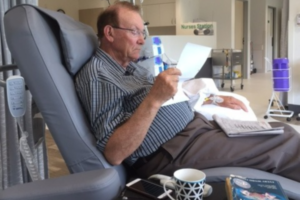Mike’s Story

There is a history of bowel cancer in my family; my mother having died at 48 and my brother having died at 36 from it. Because of my family history, I had been undergoing 5 yearly colonoscopy checks. Nothing adverse was found prior to my 2018 check, when two large tumours were discovered in my bowel. I had unfortunately left it more than 5 years to have this check undertaken. A PET scan revealed that the cancer had metastasised outside of my bowel and I was told that my condition was terminal and that surgery was not being considered. However, after a course of chemotherapy, my CEA rating reduced from 55 to 19 and after remaining stable for an additional 15 months, it was decided to proceed with an operation to remove the tumours. I have experienced 5 years of relative remission since my first diagnosis, without treatment and with a stable CEA rating of 11.
My latest tests however, have indicated that my cancer may be relapsing, and I am currently undergoing examinations to gauge the level of reactivity and need for further treatment.
I accepted my original diagnosis in a relatively matter of fact way and focused on completing the course of treatment that was presented to me. It was particularly noticeable that wherever I went, people were planning for their futures, whereas it did not seem I had one. I found it helpful to focus on small, short-term goals (birthdays, trips away), and as each one passed, set myself new ones. I haven’t really dwelt on my illness and have just got on with things. I do have a strong faith to fall back on.
My diagnosis has not prevented me from doing anything, and I have joined several organisations and become more involved in community work since my diagnosis. Activity wise, I am golfing and enjoying travelling. My family seem to have accepted the situation well. I have been fortunate in that I have had 3 monthly visits to my oncologist throughout my illness and this has given me the opportunity to discuss any issues that have arisen. I have not experienced any pain but in hindsight, was becoming tired and less energetic than normal.
Genetic testing has revealed that some members of my family carry the MLH1 mutation, commonly referred to as Lynch Syndrome, and this is why there is such a high level of incidence of bowel cancer in my family. A simple blood test can reveal if a family member has the mutation and enable them to undergo monitoring through out their lives to help identify any incidence of bowel cancer in its early stages.
My advice to others is to take advantage of testing on a regular basis, take the blood test for the MLH1 mutation, and act on the advice of the medical professionals. If you are diagnosed with bowel cancer, keep a strongly positive outlook, set yourselves short to medium term goals, and immerse yourselves in the activities that you normally undertake. I am 75 years old.


